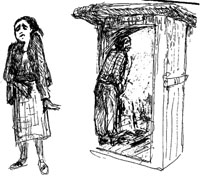4.3 STI prevention strategies for young people
As a Health Extension Practitioner, you should advise and encourage young people to adopt the following healthy behaviours:
- Delay onset of sexual activity. Abstain from sexual intercourse until married or in a stable relationship.
- Learn how to use condoms. If young people are already sexually active, it is important to make sure they know how to use condoms correctly. You should demonstrate the proper use of condoms in your education sessions related to sexually transmitted infections either individually or in group meetings (in schools, at the health post or in the community).
- Condoms should always be used except when pregnancy is desired or when partners in a stable relationship know for certain they are both disease-free.
- Avoid any kind of risky behaviour; try to stick with one partner. Boys should avoid having contact with prostitutes.
- Discuss sexual issues. Young men and women must feel comfortable communicating with their partners and family about sex and their sexual histories. A communicative relationship is essential to emotional and physical health.

When you discuss these sexual issues with young people it is also a good idea to tell them how to recognise the symptoms of STIs (Figure 4.2). For example, you should explain that if they experience burning with urination, have a discharge from the penis/vagina, and/or have genital sores then they and their partner should not have sex but should go to the higher level health facility for treatment.
4.2 Impact of STIs (including HIV) on young people
